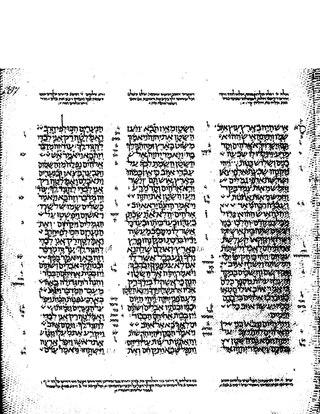Top Qs
Timeline
Chat
Perspective
Job 25
25th chapter of the Book of Job From Wikipedia, the free encyclopedia
Remove ads
Job 25 is the 25th chapter of the Book of Job in the Hebrew Bible or the Old Testament of the Christian Bible.[1][2] The book is anonymous; most scholars believe it was written around 6th century BCE.[3][4] This chapter records the speech of Bildad the Shuhite (one of Job's friends), which belongs to the Dialogue section of the book, comprising Job 3:1–31:40.[5][6]
Remove ads
Text
The original text is written in Hebrew language. This chapter is divided into 6 verses.
Textual witnesses
Some early manuscripts containing the text of this chapter in Hebrew are of the Masoretic Text, which includes the Aleppo Codex (10th century), and Codex Leningradensis (1008).[7]
There is also a translation into Koine Greek known as the Septuagint, made in the last few centuries BC; some extant ancient manuscripts of this version include Codex Vaticanus (B; B; 4th century), Codex Sinaiticus (S; BHK: S; 4th century), and Codex Alexandrinus (A; A; 5th century).[8]
Remove ads
Analysis
Summarize
Perspective
The structure of the book is as follows:[9]
- The Prologue (chapters 1–2)
- The Dialogue (chapters 3–31)
- The Verdicts (32:1–42:6)
- The Epilogue (42:7–17)
Within the structure, chapter 25 is grouped into the Dialogue section with the following outline:[10]
- Job's Self-Curse and Self-Lament (3:1–26)
- Round One (4:1–14:22)
- Round Two (15:1–21:34)
- Round Three (22:1–27:23)
- Eliphaz (22:1–30)
- Job (23:1–24:25)
- Bildad: Humans Are Worthless before God (25:1–6)
- Job (26:1–27:23)
- Interlude – A Poem on Wisdom (28:1–28)
- Job's Summing Up (29:1–31:40)
The Dialogue section is composed in the format of poetry with distinctive syntax and grammar.[5] Comparing the three cycles of debate, the third (and final) round can be seen as 'incomplete', because there is no speech from Zophar and the speech by Bildad is very short (6 verses only), which may indicate as a symptom of disintegration of the friends' arguments.[11] Clearly Bildad has little to say and running out of steam before he (and the other two friends, Eliphaz and Zophar) tail off into silence.[12] The dialogue between Job and his three friends is practically over, with neither Job nor the friends getting closer in their positions to each other.[12] Bildad's strong belief in the retribution theology makes him to see that humans are worthless and contemptible before the transcendent God who establishes "order" (literally "peace") in heavens (verse 2; cf. Genesis 1:2–3; Job 9:13; 26:12–13; comparable to the defeat of chaos in the Babylonian and Canaanite myth).[13] This speech adds little because it seems like a mechanical repetition of what Eliphaz has said in his first two speeches (Job 4:17; 15:14; and concurred by Job in Job 9:2; 14:4) that no one is righteous before God and Job has accepted that he is a sinner, only that Job still questions his sufferings compared to other sinners.[14]

Verses 5–6
- [Bildad said:] "5Behold, even the moon does not shine,
- and the stars are not pure in His sight;
- 6how much less man, who is a maggot?
- And the son of man, who is a worm?"[15]
- "Pure": here refers to the star brightness which, as the moonlight, can be obscured by clouds, to describe the moral impurities of human before the righteous God.[16]
- "Maggot": paralleled with "worm" to describe 'man in his lowest and most ignominious shape'.[17][18] Bildad misconstrues God as viewing humans with utter revulsion as just maggots and worms.[16]
Remove ads
See also
References
Sources
External links
Wikiwand - on
Seamless Wikipedia browsing. On steroids.
Remove ads


